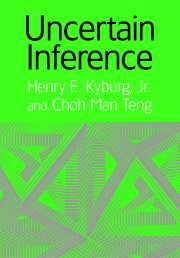Book contents
- Frontmatter
- Contents
- Preface
- 1 Historical Background
- 2 First Order Logic
- 3 The Probability Calculus
- 4 Interpretations of Probability
- 5 Nonstandard Measures of Support
- 6 Nonmonotonic Reasoning
- 7 Theory Replacement
- 8 Statistical Inference
- 9 Evidential Probability
- 10 Semantics
- 11 Applications
- 12 Scientific Inference
- Names Index
- Index
6 - Nonmonotonic Reasoning
Published online by Cambridge University Press: 07 December 2009
- Frontmatter
- Contents
- Preface
- 1 Historical Background
- 2 First Order Logic
- 3 The Probability Calculus
- 4 Interpretations of Probability
- 5 Nonstandard Measures of Support
- 6 Nonmonotonic Reasoning
- 7 Theory Replacement
- 8 Statistical Inference
- 9 Evidential Probability
- 10 Semantics
- 11 Applications
- 12 Scientific Inference
- Names Index
- Index
Summary
Introduction
Classical logic—including first order logic, which we studied in Chapter 2—is concerned with deductive inference. If the premises are true, the conclusions drawn using classical logic are always also true. Although this kind of reasoning is not inductive, in the sense that any conclusion we can draw from a set of premises is already “buried” in the premises themselves, it is nonetheless fundamental to many kinds of reasoning tasks. In addition to the study of formal systems such as mathematics, in other domains such as planning and scheduling a problem can in many cases also be constrained to be mainly deductive.
Because of this pervasiveness, many logics for uncertain inference incorporate classical logic at the core. Rather than replacing classical logic, we extend it in various ways to handle reasoning with uncertainty. In this chapter, we will study a number of these formalisms, grouped under the banner nonmonotonic reasoning. Monotonicity, a key property of classical logic, is given up, so that an addition to the premises may invalidate some previous conclusions. This models our experience: the world and our knowledge of it are not static; often we need to retract some previously drawn conclusion on learning new information.
Logic and (Non)monotonicity
One of the main characteristics of classical logic is that it is monotonic, that is, adding more formulas to the set of premises does not invalidate the proofs of the formulas derivable from the original premises alone. In other words, a formula that can be derived from the original premises remains derivable in the expanded premise set.
- Type
- Chapter
- Information
- Uncertain Inference , pp. 117 - 151Publisher: Cambridge University PressPrint publication year: 2001



